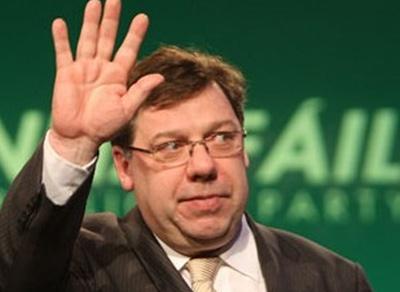As Honohan’s report emerges, the Dáil is gagged

In the week of the publication of the Honohan report on the banking crisis there will be no debate on the issue, no Dáil questions, no Dáil motions, nothing. By Vincent Browne.
Central Bank governor Patrick Honohan’s report on the financial collapse of the banking sector was presented to Minister for Finance Brian Lenihan last Monday.
Lenihan read it then, and told his cabinet colleagues about it on Tuesday. The report is to be considered this Tuesday by the cabinet - or at least by those cabinet ministers who have decided not to go off on an unearned holiday.
When the cabinet ministers who are around have decided how to ‘‘spin’’ the report, it will be published - but only then.
Meanwhile, the citizens, the sovereign power of the state, are denied the opportunity to read their report, concerning their affairs, the consequences for their livelihoods, how their servants in government managed what has become their crisis and the lead-up to it. First, their servants in government (ie, the cabinet ministers) will decide how citizens should understand the significance of their report.
This is ‘‘normal procedure’’. What isn’t ‘‘normal procedure’’ is what the government has done to ensure that in the week of the publication of the Honohan report on the banking crisis (which has resulted in the single greatest transfer of wealth in Ireland - possibly since the plantations - from society as a whole to a financial elite) there will be no debate on the issue, no Dáil questions, no Dáil motions, nothing.
Last Thursday, a resolution was bludgeoned through the Dáil by the Fianna Fáil/Green majority which decrees that, on Tuesday June 15, notwithstanding anything in standing orders, oral questions and private members’ business will not be taken; there will be no Order of Business; the taking of any divisions will be postponed. Instead, the Dáil will not sit at all on Tuesday week.
On Wednesday, it will sit for four-and-a-half hours, and there will be statements on the Ryan Report (containing searing revelations of the institutional abuse of children), no questions, no motions, nothing but statements on the revelations of the institutional abuse of children.
Then debate on two bills but, again, no decisions.
On Thursday, the Dáil will sit for five hours, and a few other bills will be discussed, but no decisions, no voting.
And that will be it. Not a single word will be allowed about the report on the banks.
So this week, the week of the publication of a report into perhaps the most disastrous crisis which has afflicted this society for a long time, a report which could (and should) indict the government for the most egregious neglect and abuse of its responsibilities, our national parliament will meet for nine-and-a-half hours (an average of less than two anda-half hours per day over the four-day week).
During that time, nobody will be allowed to utter a word about this massive calamity.
Honohan will report on the performance of the Central Bank and financial regulator during the financial crisis that led the Irish banks to the brink of collapse. It may well tell us what the government at the time and the minister for finance at the time (Brian Cowen) did or didn’t do.
Indeed, it is hardly believable that the former Financial Regulator, Patrick Neary, did not give some indication to the government and the minister about what was going on. Is it just possible that he was told to go easy with regulation, even though he was expressing grave anxiety about what was emerging, especially in Anglo Irish Bank?
Even if this is so, nothing will be said about it in the Dáil this week.
The second report into the crisis, by Klaus Regling and Max Watson, which will focus on the tax breaks which inflated the property bubble and for which Cowen and his predecessor, Charlie McCreevy, were responsible, will also be published next week. But there will be no debate. No comment. Nothing.
The two reports will inform the terms of reference for the second stage of the banking inquiry, which will see the establishment of a statutory commission of inquiry held in private. Cowen is determined that this will be held in secret - and with good reason.
Otherwise, he would have to give an explanation for what he did, or didn’t do, as Minister for Finance and as Taoiseach in relation to the calamity that he had such a part in causing, and to give that explanation in public and in response to meticulous examination.
The usual bluster would not work in such a setting. At least, one hopes it wouldn’t.
So the forum (ie, the Dáil) which, theoretically, is expected to enforce accountability on the executive arm of government has been bullied by the executive arm of government into remaining entirely silent on one of the most pressing issues of our time, precisely when a report on the government’s culpability for the crisis comes into the public domain.
And the sovereign people are denied knowledge of the report until the government has its spin sorted out. This is called democracy, I think.
